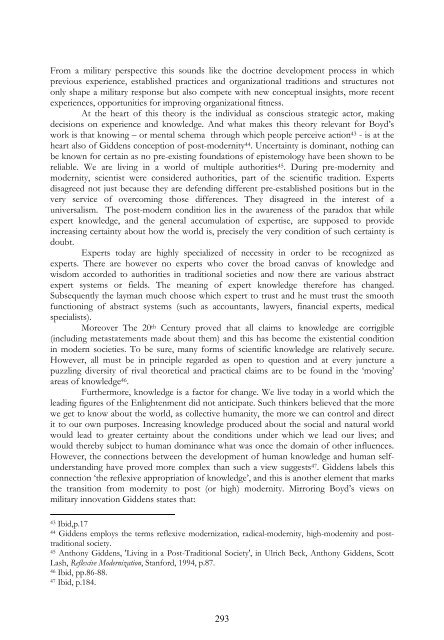Science, Strategy and War The Strategic Theory of ... - Boekje Pienter
Science, Strategy and War The Strategic Theory of ... - Boekje Pienter
Science, Strategy and War The Strategic Theory of ... - Boekje Pienter
Create successful ePaper yourself
Turn your PDF publications into a flip-book with our unique Google optimized e-Paper software.
From a military perspective this sounds like the doctrine development process in whichprevious experience, established practices <strong>and</strong> organizational traditions <strong>and</strong> structures notonly shape a military response but also compete with new conceptual insights, more recentexperiences, opportunities for improving organizational fitness.At the heart <strong>of</strong> this theory is the individual as conscious strategic actor, makingdecisions on experience <strong>and</strong> knowledge. And what makes this theory relevant for Boyd’swork is that knowing – or mental schema through which people perceive action 43 - is at theheart also <strong>of</strong> Giddens conception <strong>of</strong> post-modernity 44 . Uncertainty is dominant, nothing canbe known for certain as no pre-existing foundations <strong>of</strong> epistemology have been shown to bereliable. We are living in a world <strong>of</strong> multiple authorities 45 . During pre-modernity <strong>and</strong>modernity, scientist were considered authorities, part <strong>of</strong> the scientific tradition. Expertsdisagreed not just because they are defending different pre-established positions but in thevery service <strong>of</strong> overcoming those differences. <strong>The</strong>y disagreed in the interest <strong>of</strong> auniversalism. <strong>The</strong> post-modern condition lies in the awareness <strong>of</strong> the paradox that whileexpert knowledge, <strong>and</strong> the general accumulation <strong>of</strong> expertise, are supposed to provideincreasing certainty about how the world is, precisely the very condition <strong>of</strong> such certainty isdoubt.Experts today are highly specialized <strong>of</strong> necessity in order to be recognized asexperts. <strong>The</strong>re are however no experts who cover the broad canvas <strong>of</strong> knowledge <strong>and</strong>wisdom accorded to authorities in traditional societies <strong>and</strong> now there are various abstractexpert systems or fields. <strong>The</strong> meaning <strong>of</strong> expert knowledge therefore has changed.Subsequently the layman much choose which expert to trust <strong>and</strong> he must trust the smoothfunctioning <strong>of</strong> abstract systems (such as accountants, lawyers, financial experts, medicalspecialists).Moreover <strong>The</strong> 20 th Century proved that all claims to knowledge are corrigible(including metastatements made about them) <strong>and</strong> this has become the existential conditionin modern societies. To be sure, many forms <strong>of</strong> scientific knowledge are relatively secure.However, all must be in principle regarded as open to question <strong>and</strong> at every juncture apuzzling diversity <strong>of</strong> rival theoretical <strong>and</strong> practical claims are to be found in the ‘moving’areas <strong>of</strong> knowledge 46 .Furthermore, knowledge is a factor for change. We live today in a world which theleading figures <strong>of</strong> the Enlightenment did not anticipate. Such thinkers believed that the morewe get to know about the world, as collective humanity, the more we can control <strong>and</strong> directit to our own purposes. Increasing knowledge produced about the social <strong>and</strong> natural worldwould lead to greater certainty about the conditions under which we lead our lives; <strong>and</strong>would thereby subject to human dominance what was once the domain <strong>of</strong> other influences.However, the connections between the development <strong>of</strong> human knowledge <strong>and</strong> human selfunderst<strong>and</strong>inghave proved more complex than such a view suggests 47 . Giddens labels thisconnection ‘the reflexive appropriation <strong>of</strong> knowledge’, <strong>and</strong> this is another element that marksthe transition from modernity to post (or high) modernity. Mirroring Boyd’s views onmilitary innovation Giddens states that:43 Ibid,p.1744 Giddens employs the terms reflexive modernization, radical-modernity, high-modernity <strong>and</strong> posttraditionalsociety.45 Anthony Giddens, 'Living in a Post-Traditional Society', in Ulrich Beck, Anthony Giddens, ScottLash, Reflexive Modernization, Stanford, 1994, p.87.46 Ibid, pp.86-88.47 Ibid, p.184.293
















